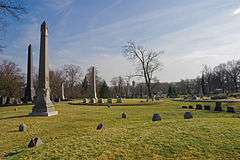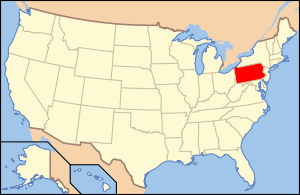Allegheny Cemetery
|
Allegheny Cemetery | |
|
Allegheny Cemetery in 2008 | |
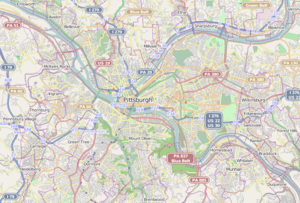   | |
| Location | Roughly bounded by N. Mathilda and Butler Sts., and Penn, Stanton, and Mossfield Aves., Pittsburgh, Pennsylvania |
|---|---|
| Coordinates | 40°28′N 79°57′W / 40.467°N 79.950°WCoordinates: 40°28′N 79°57′W / 40.467°N 79.950°W |
| Area | 300 acres (120 ha) |
| Built | 1844 |
| Architect | Chislett,John; Multiple |
| Architectural style | Late Victorian, Tudor Revival, English Gothic |
| NRHP Reference # | [1] |
| Significant dates | |
| Added to NRHP | December 10, 1980 |
| Designated PHLF | 1988[2] |
Allegheny Cemetery is one of the largest and oldest burial grounds in Pittsburgh, Pennsylvania, USA.
It is a nonsectarian, wooded hillside park located at 4734 Butler Street in the Lawrenceville neighborhood and bounded by the Bloomfield, Garfield, and Stanton Heights areas. It is sited on the north-facing slope of hills above the Allegheny River.[3]
In 1973 the cemetery's Butler Street Gatehouse was listed on the National Register of Historic Places and in 1980 the entire cemetery was listed on the National Register.[4]
History
Incorporated in 1844, the Allegheny Cemetery is the sixth oldest rural cemetery in America and has expanded over the years to now encompass 300 acres (120 ha).[3]
Allegheny Cemetery memorializes more than 124,000 people.[5] Some of the oldest graves are of soldiers who fought in the French and Indian War, which were moved here from their original burial site at Pittsburgh's Trinity Cathedral downtown. Many notables from the city of Pittsburgh are buried here. The cemetery was amongst those profiled in the PBS documentary A Cemetery Special.[3]
In 1834 three members of the Third Presbyterian Church of Pittsburgh, Dr. J. Ramsey Speer, Stephen Colwell and John Chislett, Sr. tried to establish a rural cemetery near Pittsburgh. Dr. Speer later visited several famous rural cemeteries, Mount Auburn Cemetery on Boston, Laurel Hill Cemetery in Philadelphia, and Green-Wood Cemetery in New York. In 1842 the 100 acre farm of Colonel Bayard was selected for the site. An Act of Incorporation passed the Pennsylvania Legislature and was signed by Gov. David R. Porter on April 24, 1844.[6]
"Mt. Barney" was selected as the site of a memorial to naval heroes in 1848 and Commodore Joshua Barney and Lt. James L. Parker were reinterred there. Another memorial was erected on Memorial Day, 1937 to the memory of over 7,000 servicemen buried in the cemetery.[6]
Notable interments


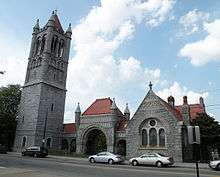
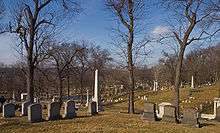
- Marcus E. Baldwin (1863–1929), Major League Baseball Player
- Joseph Baker (1806–1862), mayor of Pittsburgh (1850–1851)
- Joshua Barney (1759–1818), Commodore in the United States Navy and American Revolutionary War veteran
- Richard Biddle (1796–1847), US Congressman
- Lem Billings (1916-1981), friend and campaigner for John F. Kennedy
- Marcus Peter Blakemore (1889–1959), founder Kappa Alpha Psi Fraternity, Inc.
- Francis B. Brewer (1820–1892), US Congressman
- Don Brockett (1930–1995), motion picture and television actor, "Chef Brockett" on the PBS series Mister Rogers' Neighborhood
- James W. Brown (1844–1909), US Congressman
- Eben Byers (1880–1932), wealthy American industrialist and socialite noted for his gruesome death caused by consumption of the radioactive patent medicine Radithor.
- John Caldwell, Jr. (1827–1902), George Westinghouse partner and member of the South Fork Fishing and Hunting Club
- Louis Semple Clarke (1867–1957), automotive pioneer, founder of the Autocar Company and member of the South Fork Fishing and Hunting Club
- James Wallace Conant (1862–1906), manager of the Schenley Park Casino and Duquesne Gardens and founder of the Western Pennsylvania Hockey League.
- Beano Cook (1931–2012), college football commentator
- John Dalzell (1845–1927), US Congressman
- Cornelius Darragh (1809–1854), US Congressman
- Ebenezer Denny (1761–1822), first mayor of Pittsburgh, American Revolutionary War veteran
- Harmar Denny (1794–1852), U.S. Congressman
- Harmar D. Denny, Jr. (1886–1966), US Congressman
- William J. Diehl (1845–1929), Pittsburgh Mayor
- Harry Allison Estep (1884–1968), US Congressman
- John Baptiste Ford (1811–1903), industrialist, founder of PPG Industries and Ford City, Pennsylvania
- Walter Forward (1786–1852), United States Secretary of the Treasury
- Stephen Foster (1826–1864), songwriter
- Josh Gibson (1911–1947), baseball great of the Negro Leagues
- Gus Greenlee (1893–1952), Major League Baseball Team Owner
- Moses Hampton (1803–1878), US Congressman
- General Alexander Hays (1819–1864)
- William B. Hays (1844–1912), Pittsburgh mayor
- Joseph Horne (1826–1891), founder of Pittsburgh department store Horne's the chain of stores closed in 1994
- Thomas Marshall Howe (1808–1877), US Congressman
- Alfred E. Hunt (1855–1899), co-founder of the company that became Alcoa
- Thomas Irwin (1785–1870), US Congressman
- William Wallace Irwin (1803–1856), US Congressman, Pittsburgh Mayor
- William Freame Johnston (1808–1872), Governor of Pennsylvania
- Samuel Kier (1813–1874), pioneer oil refiner
- Andrew W. Loomis (1797–1873), US Congressman
- F. T. F. Lovejoy (1854–1932), Industrialist, associate of Andrew Carnegie
- William McClelland (1842–1892), US Congressman
- Charles McClure (1804–1846), US Congressman
- James McCord (1822–1894), millionaire owner of the oldest hattery west of the Allegheny Mountains and member of the South Fork Fishing and Hunting Club
- Henry Sellers McKee (1843–1924), millionaire glass manufacturer, founder of Jeannette, Pennsylvania and member of the South Fork Fishing and Hunting Club
- Robert McKnight (1820–1885), US Congressman
- William McNair (1880–1948), Pittsburgh mayor
- Thomas Mellon (1813–1908), founder of Mellon Bank
- Alexander Pollock Moore (1867–1930), publisher of the Pittsburgh Leader and ambassador who was married to actress Lillian Russell
- James Kennedy Moorhead (1806–1884), US Congressman
- General James S. Negley (1826–1901), Civil War general and U.S. Congressman
- General John Neville (1731–1803), American Revolutionary War veteran
- George Tener Oliver (1848–1919), publisher of the Pittsburgh Gazette Times and Chronicle Telegraph, US Senator
- Alfred L. Pearson (1838–1903), United States Army officer
- Henry Kirke Porter (1840–1921), US Congressman
- James Hay Reed (1853–1927), founding partner, Knox & Reed (now Reed Smith LLP), and member of the South Fork Fishing and Hunting Club
- John Buchanan Robinson (1846–1933), US Congressman
- Calbraith Perry Rodgers (1879–1912), aviation pioneer
- James Ross (1762–1847), US Senator
- Archibald H. Rowand, Jr. (1845–1913), Civil War Congressional Medal of Honor Recipient
- Lillian Russell (1861–1922), singer, actress
- Ted Sadowski (1936–1993), Major League Baseball Player
- Richard Mellon Scaife (1932–2014), billionaire supporter of conservative causes, publisher of the Pittsburgh Tribune-Review
- George Shiras, Jr. (1832–1924), United States Supreme Court Associate Justice
- Jane Swisshelm (1815–1884), journalist, abolitionist, and women's rights advocate
- Adamson Tannehill (1750–1820), US Congressman
- Benjamin Thaw (1859–1933), Pittsburgh financier and member of the South Fork Fishing and Hunting Club
- Harry Kendall Thaw, (1871–1947), murderer of architect Stanford White, husband of Evelyn Nesbit
- Stanley Turrentine (1934–2000), jazz musician
- Calvin Wells (1827–1909), industrialist, financier and member of the South Fork Fishing and Hunting Club
- Thomas Williams (1806–1872), Civil War congressman, prosecutor in the impeachment of President Andrew Johnson.
- The unidentified remains of 54 victims of the 1862 Allegheny Arsenal explosion.
Gallery
-
Angel of the Resurrection on James B. Hogg monument (sculpted by Henry Kirke Brown, ca. 1850)
-
Angel of the Resurrection on James B. Hogg monument (sculpted by Henry Kirke Brown, ca. 1850)
-
Faith, Hope and Charity on Moorhead Column (sculpted by Carl Conrads, 1877)
See also
References
- ↑ National Park Service (2009-03-13). "National Register Information System". National Register of Historic Places. National Park Service.
- ↑ Historic Landmark Plaques 1968-2009 (PDF). Pittsburgh, PA: Pittsburgh History & Landmarks Foundation. 2010. Archived (PDF) from the original on 21 July 2011. Retrieved 2011-07-30.
- 1 2 3 Kidney, Walter C. (1990). Allegheny Cemetery: A Romantic Landscape in Pittsburgh. Pittsburgh: Pittsburgh History and Landmarks Foundation. ISBN 0-916670-14-7.
- ↑ Van Trump, James D. (1973). "Butler Street Gateway - Allegheny Cemetery" (PDF). National Register of Historic Places Nomination Form. Pennsylvania Historical and Museum Commission. Retrieved January 11, 2014.
- ↑ "Allegheny Cemetery". Retrieved January 26, 2014.
- 1 2 "History". Allegheny Cemetery. Retrieved January 26, 2014.
External links
- Official website
- Allegheny Cemetery at Find A Grave
- Historic American Landscapes Survey (HALS) No. PA-3-A, "Allegheny Cemetery, Soldiers Lot"
- HALS No. PA-3-B, "Allegheny Cemetery, Butler Street Gate House"
- Historic Landscape Survey of Allegheny County Records, 1970-2002, AIS.2005.01, Archives Service Center, University of Pittsburgh
